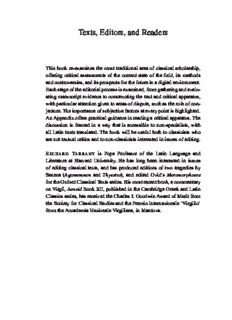Table Of ContentTexts, Editors, and Readers
T his book re-examines the most traditional area of classical scholarship,
offering critical assessments of the current state of the fi eld, its methods
and controversies, and its prospects for the future in a digital environment.
Each stage of the editorial process is examined, from gathering and evalu-
ating manuscript evidence to constructing the text and critical apparatus,
with particular attention given to areas of dispute, such as the role of con-
jecture. The importance of subjective factors at every point is highlighted.
An Appendix offers practical guidance in reading a critical apparatus. The
discussion is framed in a way that is accessible to non-specialists, with
all Latin texts translated. The book will be useful both to classicists who
are not textual critics and to non-classicists interested in issues of editing.
Richard Tarrant is Pope Professor of the Latin Language and
Literature at Harvard University. He has long been interested in issues
of editing classical texts, and has produced editions of two tragedies by
Seneca ( Agamemnon and T hyestes) , and edited Ovid’s Metamorphoses
for the Oxford Classical Texts series. His most recent book, a commentary
on Virgil, Aeneid Book XII, published in the Cambridge Greek and Latin
Classics series, has received the Charles J. Goodwin Award of Merit from
the Society for Classical Studies and the Premio Internazionale ‘Virgilio’
from the Accademia Nazionale Virgiliana, in Mantova.
ROMAN LITERATURE
AND ITS CONTEXTS
Series editors :
Denis Feeney and Stephen Hinds
T his series promotes approaches to Roman literature which are open to dialogue
with current work in other areas of the classics, and in the humanities at large.
The pursuit of contacts with cognate fi elds such as social history, anthropology,
history of thought, linguistics and literary theory is in the best traditions of clas-
sical scholarship: the study of Roman literature, no less than Greek, has much
to gain from engaging with these other contexts and intellectual traditions. The
series offers a forum in which readers of Latin texts can sharpen their readings
by placing them in broader and better-defi ned contexts, and in which other clas-
sicists and humanists can explore the general or particular implications of their
work for readers of Latin texts. The books all constitute original and innovative
research and are envisaged as suggestive essays whose aim is to stimulate debate.
Other books in the series
Joseph Farrell , Latin language and Latin culture: from ancient to modern times
A. M. Keith , Engendering Rome: women in Latin epic
William Fitzgerald , Slavery and the Roman literary imagination
Stephen Hinds , Allusion and intertext: dynamics of appropriation in
Roman poetry
Denis Feeney , Literature and religion at Rome: cultures, contexts, and beliefs
Catherine Edwards , Writing Rome: textual approaches to the city
Duncan F. Kennedy , The arts of love: fi ve studies in the discourse of Roman
love elegy
Charles Martindale , Redeeming the text: Latin poetry and the hermeneutics of
reception
Philip Hardie , The epic successors of Virgil: a study in the
dynamics of a tradition
Alain Gowing , Empire and memory: the representation of the Roman Republic
in imperial culture
Richard Hunter , The shadow of Callimachus: studies in the reception of
Hellenistic poetry at Rome
James J. O’Hara , Inconsistency in Roman epic: studies in Catullus, Lucretius,
Vergil, Ovid and Lucan
Ellen Oliensis , Freud’s Rome: psychoanalysis and Latin poetry
Texts, editors,
and readers
Methods and problems in Latin
textual criticism
Richard Tarrant
Pope Professor of Latin
Harvard University
University Printing House, Cambridge CB2 8BS, United Kingdom
Cambridge University Press is part of the University of Cambridge.
It furthers the University’s mission by disseminating knowledge in the pursuit of
education, learning and research at the highest international levels of excellence.
www.cambridge.org
Information on this title: www.cambridge.org/9780521766579
© Richard Tarrant 2016
This publication is in copyright. Subject to statutory exception
and to the provisions of relevant collective licensing agreements,
no reproduction of any part may take place without the written
permission of Cambridge University Press.
First published 2016
Printed in the United Kingdom by Clays, St Ives plc
A catalogue record for this publication is available from the British Library
Library of Congress Cataloguing in Publication Data
Names: Tarrant, R. J. (Richard John), 1945– author.
Title: Texts, editors, and readers : methods and problems in Latin
textual criticism / Richard Tarrant.
Description: Cambridge : Cambridge University Press, 2016. |
Series: Roman literature and its contexts |
Includes bibliographical references and index.
Identifi ers: LCCN 2015042954 | ISBN 9780521766579 (hardback) |
ISBN 9780521158992 (pbk)
Subjects: LCSH: Latin literature–Criticism, Textual.
Classifi cation: LCC PA 6141. T 37 2016 | DDC 870.9–dc23
LC record available at http://lccn.loc.gov/2015042954
ISBN 978-0-521-76657-9 Hardback
ISBN 978-0-521-15899-2 Paperback
Cambridge University Press has no responsibility for the persistence or accuracy of
URL s for external or third-party internet websites referred to in this publication,
and does not guarantee that any content on such websites is, or will remain,
accurate or appropriate.
Robin Nisbet
In Memoriam
Contents
Preface page xi
Introduction 1
1 Textual criticism in a post-heroic age 18
2 The rhetoric of textual criticism/textual criticism as rhetoric 30
3 Establishing the text 1: recension 49
4 Establishing the text 2: conjecture 65
5 Establishing the text 3: interpolation, collaboration, and
intertextuality 85
6 Textual criticism and literary criticism: the case of Propertius 105
7 Presenting the text: the critical edition and its discontents 124
8 The future: problems and prospects 145
Appendix: Reading a critical apparatus 157
Bibliography 170
General index 182
Index of passages discussed 186
Index of scholars 189
ix
Description:This book re-examines the most traditional area of classical scholarship, offering critical assessments of the current state of the field, its methods and controversies, and its prospects for the future in a digital environment. Each stage of the editorial process is examined, from gathering and eva

